Supply Chain Blockchain: Transforming Logistics and Transparency
Supply Chain Blockchain is a distributed ledger that records every step of a product’s journey from raw material to consumer. When working with Supply Chain Blockchain, the system provides immutable data, real‑time visibility, and automated verification. Also known as blockchain for logistics, it helps cut fraud, lower costs, and speed up settlements.
Core Building Blocks
One key component is Tokenization, the process of converting physical assets into digital tokens on a blockchain. By turning pallets, containers, or individual items into unique IDs, companies can trade and track assets instantly across borders.
Another benefit is Traceability, the ability to follow a product’s history across every handoff. This solves counterfeiting problems and satisfies regulators who demand proof of origin.
Underlying all of this are Smart Contracts, self‑executing code that enforces agreed terms without intermediaries. They trigger automatic payments when delivery confirmation or quality checks are recorded, cutting manual paperwork.
Below you’ll find a curated collection of articles that dive into airdrops, DeFi tools, tokenomics, and real‑world case studies showing how these concepts work in practice. Explore the resources to see how supply chain blockchain is reshaping the industry today.
Top Supply Chain Blockchain Use Cases: Real-World Examples & Benefits
Explore real-world supply chain blockchain use cases, from traceability and cold‑chain monitoring to automotive parts provenance, and learn the benefits, costs, and steps to implement.
